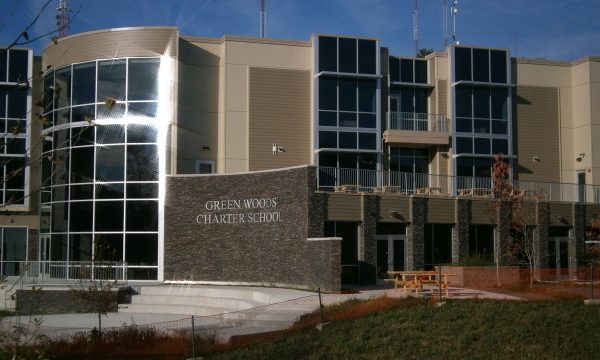Philadelphia pro-charter school groups power up

EXPERIMENTAL: Green Woods Charter School blends indoor and outdoor spaces.
By Stacia Friedman | Watchdog.org
PHILADELPHIA — While some groups seek to paint all Philadelphia charter schools with the same negative brush, two fledgling pro-charter organizations, Philadelphia Charters for Excellence and Philly School Choice, are gathering momentum.
“Are there bad charter schools? Yes, but the study done by the Center for Popular Democracy is completely one-sided and polarizing,” said PCE board chairwoman Laurada Byers. The study she references by CPD, a group that opposes privatization, blames charter schools for many of Pennsylvania’s educational problems.
PCE is an alliance of Philadelphia public charter schools committed to maintaining high academic, fiscal and governance standards. They also uphold “barrier free enrollment,” an application process required by law that doesn’t require information regarding students’ academic, behavioral or special needs issues.
“We’re small now, but we hope, one day, for PCE to be the Good Housekeeping Stamp of Approval for Philadelphia charters,” Byers said. PCE represents 27 schools, and the organization has applied for a grant to help it grow.
Co-founder and CEO of the Russell Byers Charter School and president of the Byerschool Foundation, Byers has long been an advocate of the charter school movement. In September 2013, she gave testimony before the Pennsylvania House Democratic Policy Committee:
“Charters in Philadelphia are collectively being scapegoated for many of the financial problems the district is encountering,” Byers told the committee. “To blame charters for the district’s situation is to blame families who have chosen to seek a better education for their children.”
She concluded her testimony with a plea for cooperation.“We have to stop being adversarial, join together and get our kids what they deserve. They deserve an equitable state funding formula.”
In 2001, Byers established Russell Byers Charter School, a K4 through sixth grade school named in memory of her husband, a former Philadelphia regional administrator for the U.S. Department of Housing and Urban Development an educational columnist at the Philadelphia Daily News. Russell Byers was murdered at 59 during a robbery attempt.
At the time, there were 25 charter schools in the city. Today, there are 84.
Byers School data refutes the accusations of critics who say charter schools don’t proportionally serve students from low-income families or require special education. Pennsylvania System of School Assessment test scores ranked in the top 10 percent of public elementary schools in the city. The kids are from 43 zip codes. Eighty-eight percent are eligible for free or reduced lunch, and 13 percent have special education needs.
PennCAN, an advocacy organization that supports educational opportunities for underserved children, ranked Byers School as the second highest in “Black Student Performance” and the school scored nine out of 10 in the recent “Great Philly Schools” ranking.
Byers School received 1,600 applications for 18 slots in its kindergarten. Byers has put in a request five times to the Philadelphia School Reform Commission to add seventh and eighth grades to her school.
In response to growing demand, Byers is planning to open a second elementary charter school in the city.
A recent article in The Nation, by New York University sociology professor Pedro Noguera, said there’s little “real data” in charter schools and that they lack financial transparency and underserve special education students.
Lindsey Burke, an education policy expert at the Heritage Foundation, doesn’t buy it.
“Charter schools are incredibly transparent,” she said. “They are public schools operating under the same state accountability as neighborhood schools. Their records are open and available to the public.”
Meanwhile, a TV ad campaign in Philadelphia is encouraging viewers to join Philly School Choice, a new pro-charter organization.
“I’m not an actor. I’m just a concerned parent,” said John Hamilton in the ad. He resides in the Germantown section of the city with his wife and two young daughters, who were attending kindergarten and second grade at Greene Street Friends, a private Quaker school.
“With tuition from $10,000 to $20,000 a year for two children, and thinking ahead to college and grad school, we were planning on moving to a suburban school district to take advantage of excellent public schools,” Hamilton said. “Then, I heard about Green Woods Charter School in Roxborough. They have a new building that compares to any suburban school, and their students go on to the best high schools in the city.”
“We decided to stay in the city and enroll our girls at Green Woods. They’re getting a great education. Tuition free,” Hamilton told Watchdog.org.
Jean M. Wallace, CEO of Green Woods Charter School, said when she designed the school she wanted it to be “everything I always wanted in a school.”
That included a blurring of indoor and outdoor spaces with several terraces in a woodsy setting.
“We promote experiential learning,” Wallace said. “Right now our fourth grade is sailing on the Delaware.”
Wallace feels charters are misunderstood. “When people say charters are taking money from the district, they don’t understand. That isn’t the district’s money. That’s taxpayer money, following the child to the school of the taxpayer’s choice.”
“The purpose of the campaign is to brand the idea of school choice to ordinary parents,” said Bob Bowden, executive director of Choice Media which produced the ads. “The SRC could authorize more charters but they’re not doing that. They don’t have the political will to cut costs.”








